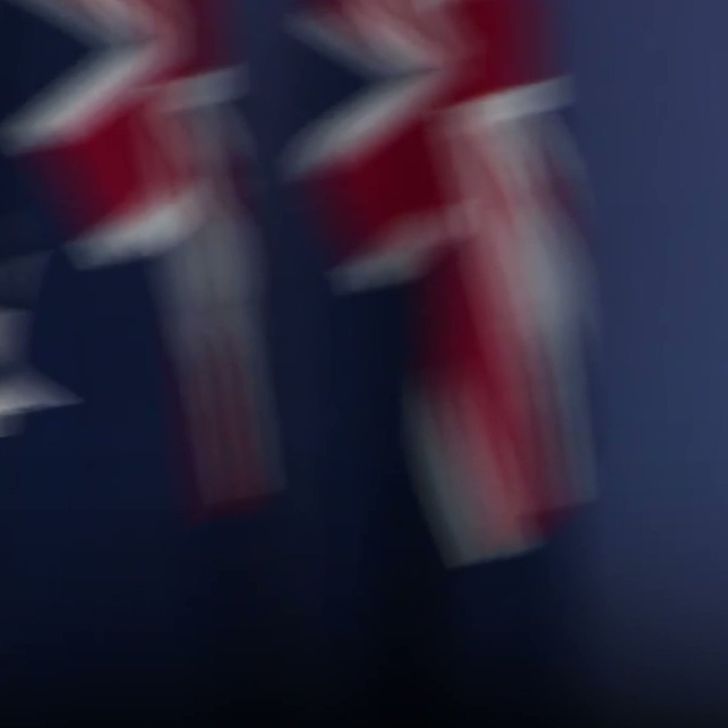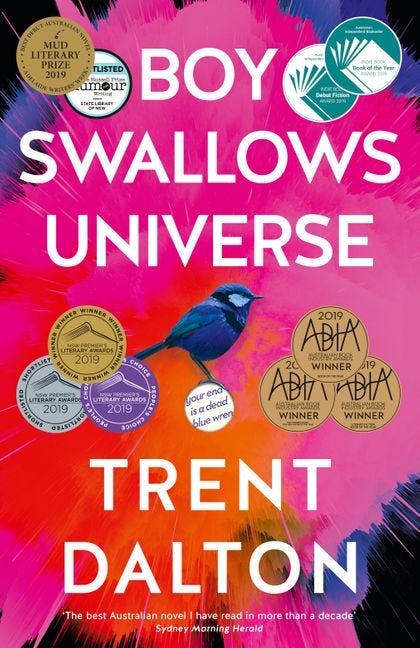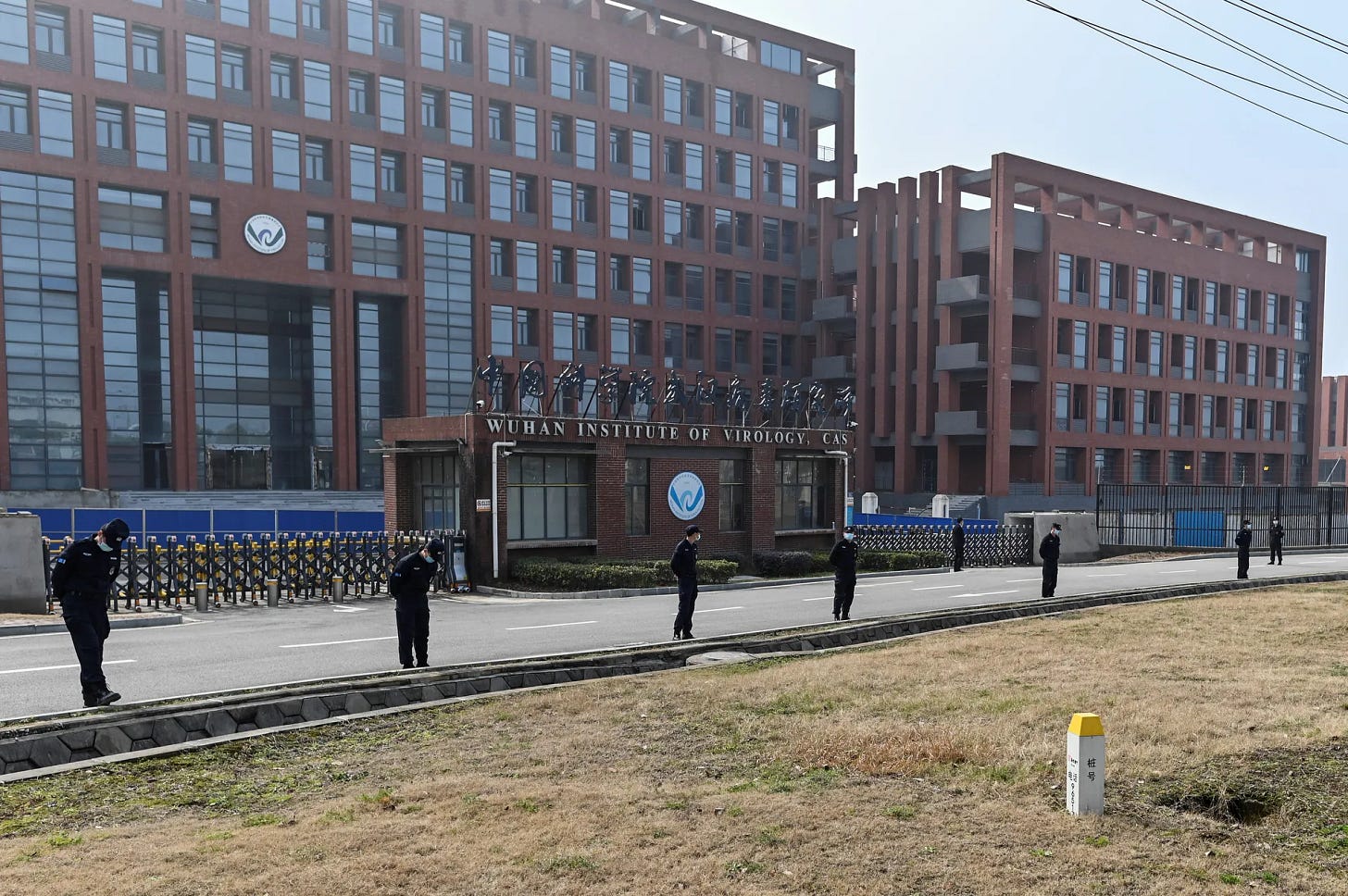It's so good having a discerning editor choosing interesting things to read. It used to be called a "magazine".
Dennis Glover
Some thoughts on voting day
It’s propaganda, but not gaslighting. And that’s just things with an economic spin. And economics is important, but not as important as — let me think off the top of my head
Gratuitously offending our regional superpower, again and again, and portraying it as ‘strength’.
Volunteering in advance for WWIII if it starts in Taiwan. (Even the Americans have not said they’d send troops — they’ve only implied it.)
Endlessly dragging the chain on greenhouse gas reduction.
Being asleep at the wheel when Pfizer offered us first dibs at their new vaccine, costing (I imagine) tens if not hundreds of Australian lives.
Retaining within Cabinet ministers who forge documents to generate fake political stories
Having governments hand out half a million dollars in damages for the dodgy personal behaviour of a minister without being publicly accountable for it with the minister being welcomed back into the cabinet.
Suggesting ICAC pursued Gladys Berejiklean’s private relationship out of purient interest rather than the high impropriety they uncovered
Along with all the standard stuff we’ve got used to — like the PM’s Office’s investigation into its own briefing against Britney Higgins.
Anyway, I don’t much like heavy partisanship. It’s such a dull pastime and it’s not long before you hear yourself saying something as empty as the chit chat on Insiders. But this is the worst government in my lifetime in terms of basic ethics and competence by a very wide margin. It would be so nice if, as a result of today, the Coalition decided that it needed to do better.
Critic swallows book
This review of Trent Dalton’s first novel Boy Swallows Universe enables me to explain what disappoints me about the Sydney Book Review. There's a strong academic and left ideological overlay in both the selection of subjects and of reviews themselves.
Me at ClubTroppo:
Well, my gob was truly smacked. First, the reviewer seems to think that the novelist's task is to represent the findings of social science on structural inequality. I mean you could write a novel about Michelangelo producing the Pieta, the David and the Sistine Ceiling, but how many people are going to produce the greatest artworks in Christendom? The idea that a little boy could grow up and do that — I mean what are the odds? Would social science say that was representative of the reality of your average life in Renaissance Florence (I hear they had a lot of structural inequality back then)?
Second, my flabber was utterly ghasted at the way in which the reviewer quotes the author's own life as no match for 'empirical research'. How dare the author use his own survival and ultimate triumph over difficult circumstances as the basis of a fictionalised story of someone triumphing over difficult circumstances! A mountain of empirical research shows that the 'proposition is false'.
'Nuf said.
Fast foodification: what is it, what's driving it, how do we stop it?
In this discussion Peyton Bowman (www.protoclassic.com/paying-attention) and I discuss my term ‘fast-foodification’. I coined the word trying to describe modern politics. The techniques used by politicians and their professional enablers are optimised to attract votes in the same way that McDonalds and KFC optimise their food with salt, sugar and fat to attract sales. We also discuss other areas characterised by fast-foodification.
And we look at the question of what psychologists call ‘primary’ and ‘secondary’ preferences — namely what we want as compared with what we want to want. Growing as people involves a process of schooling tastes to acquire better ones. We might want to get fit, find going to the gym a chore for a while as we get used to it, but once we’re habituated to it we don’t want to miss our session.
Many things in human flourishing are like this as we school ourselves and habituate ourselves to better tastes and better behaviour. Finally, having both agreed that capitalism and competition for votes tends to reinforce primary preferences — we discuss what institutions might encourage a culture in which secondary preferences might be nurtured. The mp3 audio is here.
Ezra Klein v Patrick Deneen
Patrick Deneen surprised himself a few years back when his book “Why Liberalism Failed” became a best-seller. Deneen argued it failed because it succeeded. It more or less comprehensively replaced what came before so that, as it knocked down its opponents its core nihilism was revealed — its relentless undermining of the community necessary to make human life inhabitable. It’s quite a compelling book. But since then Deneen’s leant in as it were becoming more apocalyptic about where we’re headed.
Ezra Klein is a left-liberal wunderkind who’s been steadily rising and rising for a decade or more. He’s very impressive, even though I can’t quite manage his mannerisms of speech which are served up with an intellectual Valley Girl accent. Anyway Klein goes right at Deneen. He’s direct and challenging but never rude and Deneen responds in kind. Producing a first-class exchange between people of strongly different views — the kind of thing that’s all too rare. The transcript is here.
Spectacles through the ages
I found this piece on the kinds of spectacles we’ve engineered for ourselves over the aeons very thought-provoking. It reminded me firstly of how miraculous ancient Greek spectacles were — how much they honoured human betterment. And secondly of how much more mediated and ultimately exploitative so many spectacles have been since then.
Guy Debord argued in Le société du spectacle (1967) that ‘modern conditions of production’ manifest themselves as ‘an immense accumulation of spectacles’ (Debord 12). Spectacles are, for Debord, the states in which humans are alienated from their power to direct the course of history. …
Greek spectacles divided into two main types: athletic and theatrical. The athletic spectacles, hosted in stadiums, served as the display of physical virtues of strength, agility and beauty. … The societal purpose of the athletic games was for citizens to be trained in skills conducive to warfare: ‘For a man in his prime, beauty is fitness for the exertion of warfare, together with a pleasant but at the same time formidable appearance’ (Aristotle, Rhetoric 1361b).
To Nietzsche, Greek tragedies are the highest form of art, combining the Apollonian and Dionysian drives in a spectacle that at once affirms order and expresses the untameable energy of life. It is an ‘affirmation of life even in its strangest and sternest problems, the will to life rejoicing in its own inexhaustibility through the sacrifice of its highest types’. …
The Greek athletic spectacle served to foster and exemplify the aesthetics of the virtuous citizen, whose appearance bore witness to his ethical virtues of valour, while the theatric spectacle functioned as a justification of political order without its false deification. The Ancient Olympic Games were held in the honour of Zeus and had the character of a religious festival just as much as an athletic competition. As such, these spectacles took place within the framework of a timeless world of archetypes; within a world structured by myth.
The third archetype of spectacle is to be found in Ancient Rome and its colossal circuses and amphitheatres, which operated neither in a messianic or mythical time, but in the sheer present of entertainment.
It’s super hard to get published: read all about it
Psychosis and medication: one view
Can Russia really disconnect from the rest of the digital world?
Very informative article on the difficulties of censoring the internet:
Censorious governments face a tricky balancing act in tightening their filters. Too tight and it becomes difficult to conduct ordinary business.
Why experts are terrified of a human-made pandemic — and what we can do to stop it
Decades ago, when the world first agreed on the norms and guidelines in the Biological Weapons Convention (BWC), designing and producing biological weapons was expensive and difficult. … Terrorist groups have so far largely been unable to improve on anthrax which is deadly but not contagious.
But our ability to engineer viruses has grown by leaps and bounds in recent years, thanks in part to the rapidly falling price of DNA sequencing and DNA synthesis technologies. …
“DNA is an inherently dual-use technology,” James Diggans, who works on biosecurity at the industry-leading synthetic DNA provider Twist Bioscience, told me in 2020. What that means is DNA synthesis makes fundamental biology research and lifesaving drug development go faster, but it can also be used to do research that can be deadly for humanity.
MIT have developed a framework for a potential solution. They want to maintain a database with hashes of deadly and dangerous sequences — mathematically generated strings that correspond uniquely to each sequence, but can’t be reverse-engineered to learn the dangerous original sequence if you don’t already know it. That will allow checking sequences against a list of deadly ones without risking anyone’s privacy and intellectual property, and without maintaining a public list of deadly sequences that a terror group or bioweapons program could use as a shopping list.
Crypto: Krugman’s a sceptic
But can crypto really have become such a big deal without any clear economic rationale other than pure speculation? Can it really be just a bubble inflated by FOMO, fear of missing out? Those who question crypto’s purpose are constantly confronted with the argument that the sheer scale of the industry — at their peak, crypto assets were worth almost $3 trillion — and the amount of money true believers have made along the way proves the skeptics wrong. Can we, the public, really be that foolish and gullible?
Well, maybe the crypto skeptics are wrong. But on the question of folly and gullibility, the answer is yes, we can.
What do I think? Firstly, Krugman is a very clever fellow but as I suggested here, he seems to operate very much within given intellectual frameworks. He’s not particularly talented at figuring out where and how he might be wrong. Me — my mind is open on this subject. But, since actions speak louder than words, I should tell you that a small part of my own portfolio is in crypto.
Fukuyama’s latest
Robert Solow who is a very funny man once wrote of the overly fecund Richard Posner that he wrote like other people breathed. Ditto Fukuyama who churns out one sensible book after another without much original to say. But hey — sensible summaries of the state of play aren’t so bad. (So long as you read them in review!). Naturally the brand needed an offering in the Wither Liberalism genre.
In his new book, released on Tuesday by Farrar, Straus and Giroux, Fukuyama argues that liberalism is threatened not by a rival ideology, but by “absolutized” versions of its own principles. On the right, the promoters of neoliberal economics have turned the ideal of individual autonomy and the free market into a religion, warping the economy and leading to dangerous systemic instability. And on the left, he argues, progressives have abandoned individual autonomy and free speech in favor of claims of group rights that threaten national cohesion.
“The answer to these discontents,” he writes, “isn’t to abandon liberalism, but to moderate it.”
Safeguarding: the latest Orwellian adventure
When I was charing The Australian Centre for Social Innovation (TACSI) I joked that whenever anyone mentioned ethics committees, I needed a trigger warning. I’ve never known an ethics committee to be anything less than dysfuctional. But it gets much worse than that. They’re run by career bureaucrats and, as they deliberate on the 70 odd pages of NH&MRC guidelines, the committees morph into PR enforcers.
Thus Paul Frijters ended up spending vast sums on lawyers to defend himself against ‘ethics’ and various other complaints all of which were levelled against him because of his temerity in supporting research that found that it was easier for white passengers to persuade local bus drivers to give them an emergency ride to the next stop than it was for black passengers. (The local bus company complained.) The Vice Chancellor who presided over this disgrace moved happily on to Adelaide Uni.
The ethics committee of Canberra Hospital threw a patient out of its care half way through an experimental chemo course that the hospital had agreed do. Seriously. It had become unethical. Anyway, now the Church of England is spending around £10 million a year ‘safeguarding’ people which looks like it means safeguarding itself. The articles I’ve read all suggest that the Dean of Christchurch Cathedral in Oxford, Martyn Percy was persecuted for four years for seeking to stand up to the abuses that were going on. They also reference the failure of the Bishop to be held accountable for his own neglect of proper behaviour.
These articles include those by Giles Fraser, or ‘Archbishop Cranmer’ and from Martyn Percey himself. (A cautionary note: there are clearly people who have a different view. One complainant remains unrepentant that Percey stroked her hair — despite his denials and the rejection by an independent investigation — and all the sources I’ve quoted seem to be conservatives within the Church.)
Percey’s article concludes:
My bishop decided that it was too risky to give me a licence. He would not even allow me to preach at my own farewell service—or perhaps ever again. He has no accountability, save only to God. In the end, taking leave of the Church of England was the only safe and sensible option remaining.
Can California Change?—An Interview with Michael Shellenberger
An interesting interview with Michael Shellenberger whom I met when he was campaigning as a pro-nuclear environmentalist at the Adelaide Festival of Ideas many years ago. Now he’s running for Gavin Newsom’s job of Governor of California!
Whether you’re dealing with drug addicts or with energy, you have to be a grownup. The childlike view of these things is that there’s some quick and easy solution that has no consequences and anybody who denies it is a bad person. A more mature version says there are always going to be advantages and disadvantages to particular solutions. But there needs to be some kind of balance and some kind of moderation between strictness and love—between just helping people but also demanding change.
Similarly, we get higher performance by doing hard things. Hard things actually bring out our best. And so, difficult obstacles are also the way forward. You don’t solve problems by going around them or avoiding them but by confronting them head-on and seeing them as opportunities to make yourself better.
Fruitcake watch: Wittgenstein edition
The New Yorker has a nicely written and fun 30 minute read on Wittgenstein which is — well fun and takes about 30 minutes — if you like that kind of thing. Oh — and you can also get it read to you. He certainly led a life of extraordinary conviction — endlessly sacrificing his material interests for other things. In the trenches in WWI, he volunteers for progressively more dangerous posts — all the while making notes for his philosophical blockbuster the Tractatus.
He’s also far from saintly, which adds to the mystery. As perhaps his most studious student Elizabeth Anscombe said “Predictions of ‘what Wittgenstein would say’ about some question one thought of were never correct. … I feel deeply suspicious of anyone’s claim to have understood Wittgenstein. That is perhaps because . . . I am very sure that I did not understand him”.
Here is a man with an ambiguous sense of patriotism who goes to war only because it might be a crucible in which he may show himself worthy by doing his duty. Worthy of what? Duty to whom? Only a draconian, unforgiving superego. Notoriously, when Wittgenstein decided to give away his money, it was not to the poor but to his siblings, who were perfectly well provided for already. The sacrifice was itself a good. He took the same attitude to much of life as he did to thinking: it had to hurt for it to count. In a discussion on religious views of existence, he once said, “Of this I am certain, that we are not here in order to have a good time.”
A man so demanding of himself was never going to be a tolerant soul. The novelist and philosopher Iris Murdoch, who met him twice, spoke of him as she might have done of a twentieth-century Socrates: “Both he and his setting were very unnerving. His extraordinary directness of approach and the absence of any sort of paraphernalia were the things that unnerved people.” With Wittgenstein, there were no polite formalities, but Murdoch failed to get much philosophy out of him. What good was a single philosophical conversation? he asked her. What good was a single piano lesson? [Good line ey? NG]
His tendency to turn every human encounter into a confrontation, a reckoning, sounds an awful lot like moralism. But he was not moralistic in the sense of imposing on people the demands of a received body of rules. …An intensely rational man—he had, after all, started off as a logician—he loathed mere reasonableness, a squalid ideal for squalid people. He rejected the idea that the world’s demands on the individual might have a natural limit in the reasonable.
Citizen accounts with the central bank!
Amazing no-one thought of this before. Oh wait …
When markets emerge from whatever chaos ensues over the next few years, we will need to find a way for the Fed to better fulfil its original mission of managing the money supply and supporting the banking system, without underwriting ever more bubbles in a massive, speculative financial sector that serves mainly itself.
It’s unlikely that politicians will stop passing the buck for policymaking, or that shadow banks will be put in check with formal charters, any time soon. Perhaps the simplest and most elegant solution in the short term would be to allow the Fed to focus less on financial institutions and more on real people.
One idea is for individuals to hold Fed accounts. Such digital wallets could provide a way for central banks to funnel money more precisely and directly to the places where it’s needed during a crisis. “Money could be doled out to people, not banks, on specific terms and conditions, at specific times,” Menand suggests. It’s not a solution to the larger problems of our political economy. But it might help the central bank better meet its core mission: putting money where it’s really needed.
Nothing Beautiful Survives the Culture War
Recently, Congress had the opportunity to make permanent the expanded child tax credit that the Biden administration instituted during the pandemic, but chose not to. The campaign against it was led by Republicans, including Senator Marco Rubio, Senator Mike Lee, and the policy analyst Oren Cass—family-values men, all. Each argued, in essence, that making sure poor parents are working hard is more important than making sure poor children are wearing shoes. …
Politics is downstream of culture, and this is perhaps the greatest defeat of all: Having and raising children itself now seems poised to become a culture-war issue, daily losing its discursive resemblance to an ordinary life event and gaining all the markers of a personal consumption choice that makes a statement about who you are and which side you’re on. The GOP seems all too happy to nudge the process along with caricatures of childless libs and the specter of armies of “groomers,” broadly labeling scores of left-wing educators, activists, and parents as pedophiles. …
Nothing beautiful survives the culture war. Maybe parenthood, too—this one thing, this burdensome happiness, this mundane ecstasy—will soon be another concept so thoroughly stretched and contorted by the requirements of America’s longest war that people who could have found satisfaction in it will hesitate to, and people who might have sought it out will decline to. … And maybe children themselves will become so secondary to the matter of what their existence says about the adults who bear them that legislating even for their basic welfare will become impossible. Maybe they already have.
Brad Delong thinks aloud about inflation
It’s hard — really hard — to work out what we should do in response to inflation in the absence of any clear signs of it making its way into long-term expectations. So I’m glad Brad Delong is trying to think about it.
There has been much discussion of the NAIRU or the “natural rate of unemployment”—the unemployment rate below which you should not try to push the economy—but there has been little discussion of any “natural rate of inflation”— the rate of inflation below which you should not try to push the economy. All competent macroeconomists agree that there is a positive natural rate of inflation: we have high costs of nominal wage cuts in terms of the destruction of worker-boss trust, very high costs of bankruptcy workouts, and very very sticky nominal debts. Given those institutional-structural features of the economy, a positive natural rate of inflation to grease the gears of the labor market and of the debt market is an inescapable necessity. But how high is the natural rate of inflation in normal times? And how does it alter in times of supply shocks and of sectoral-rebalancing demand shocks? Not enough economists have spent not enough time on these issues.
My view is that there is no—none—zero—case for not accommodating supply and sectoral-rebalancing shocks until they threaten to destabilize long-run inflation expectations. After they threaten to do so, there is a trade-off to be dealt with. Before they threaten to do so, there is not.
Ukraine
Putin’s minimum viable off-ramp: annexing the territory he holds and invoking nuclear ‘defence’
Worth reading, though reflects American perspectives, albeit some of the more enlightened ones, in my (deeply inexpert) judgement.
Russian President Vladimir Putin likely intends to annex occupied southern and eastern Ukraine directly into the Russian Federation in the coming months. He will likely then state, directly or obliquely, that Russian doctrine permitting the use of nuclear weapons to defend Russian territory applies to those newly annexed territories. …
Ukraine and its Western partners likely have a narrow window of opportunity to support a Ukrainian counteroffensive into occupied Ukrainian territory before the Kremlin annexes that territory (or brings up additional forces). … Poor morale and worse leadership have soundly degraded Russian forces; Ukraine should ideally counter-attack at the time of maximum Russian disorder before Russian forces have time to fully go over to the defensive and dig in. …
If Ukrainian forces do not retake southeastern Ukraine before Moscow annexes that territory, Kyiv may find that the southeast has become irreparably mired in the same situation that Crimea has faced since 2014.
The prospects of a Russian ‘splinternet’
A very informative long piece from Prospect:
Raised on freewheeling spaces like VKontakte, Russian internet users may not be as satisfied with a domestic network as Chinese users have been. And the Russian internet is not as easy to control from a technical standpoint as China’s. Internet service providers purchase the connectivity they sell to their customers from backbone providers, companies that maintain massive data pipes that carry traffic around the globe. The Chinese internet channels all traffic to international websites and services through a small handful of internet connections controlled by telecommunication providers China Telecom, China Unicom and China Mobile. These three providers “peer”—exchange traffic—with global backbone providers at a small number of internet exchange points (IXPs). China can surveil and control international traffic by filtering the content carried by these three companies and can disconnect China from the global internet by severing these few peering relationships, an architecture that led Dave Allan, a researcher at tech multinational Oracle, to observe that “China could effectively withdraw from the global public internet and maintain domestic connectivity (essentially having an intranet).”
Russian ISPs, on the other hand, connect to the global internet in many more places, a legacy of the country’s rapid and chaotic connection to the rest of the world at the end of the Cold War.
Magnificent Australian Indigenous paintings: for sale in New York
Not cheap, but remarkable.
“I wrote a story entitled ‘Recitatif,’ in which there are two little girls in an orphanage, one white and one black. But the reader doesn’t know which is white and which is black. I use class codes, but no racial codes [. . .] Soon as I say, Black woman . . . I can rest on or provoke predictable responses, but if I leave it out then I have to talk about her in a complicated way—as a person.” Toni Morrison’s Paris Review “art of fiction” interview. (HT: Helen Lewis)
An OK article on an interesting subject.
























